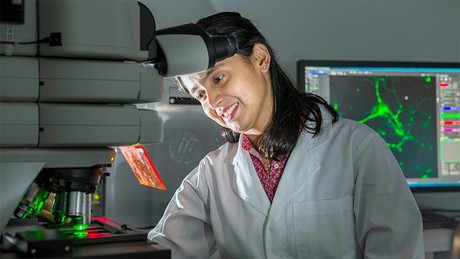2018 Tall Poppies announced

Over the past few weeks, Young Tall Poppy Science Awards have been presented across Australia, recognising the achievements of outstanding young researchers who are passionate about communicating their research and engaging with the community.
The awards are run in each state and territory by the Australian Institute of Policy and Science (AIPS), with winners announced throughout the year. These award winners (‘Tall Poppies’) participate in education and community outreach programs in which they become role models to inspire school students and the broader community about the possibilities of science.
At the end of October, five Tall Poppies were announced from Western Australia. They are as follows:
- Dr Ben Jackson, from The University of Western Australia (UWA), was named Western Australian Young Tall Poppy of the Year for his work in sport science, with current projects focused on psychological resilience, self-regulation, confidence, motivation, social support and interpersonal communication.
- Dr Luke Davies, from UWA, is using some of the world’s largest telescopes to understand how galaxies have evolved over the past eight billion years.
- Dr Andrew Guzzomi, from UWA, has been awarded for his agricultural engineering projects.
- Dr Verena Schoepf, from UWA, is exploring how reef-building corals are affected by climate and environmental change.
- Dr Ann-Maree Vallence, from Murdoch University, is investigating the role of connectivity between motor areas of the brain in movement control and learning across the lifespan.
The award ceremony for Tasmania was held shortly afterwards, recognising two Tall Poppies from the University of Tasmania:
- Dr Emily J Flies was named Tasmanian Young Tall Poppy of the Year for her work exploring how human-driven changes to the environment are impacting human health.
- Dr Lila Landowski is working in the areas of stroke and fatigue research, developing a new model for testing potential stroke therapies so that drug development can be more successful.
Five Tall Poppies from the ACT soon followed:
- Dr Bryan Lessard, from the CSIRO Australian National Insect Collection Act, was named ACT Young Tall Poppy of the Year for his research into Australian horse flies.
- Dr Anne Bruestle, from the Australian National University (ANU), is focusing on adaptive immune cells called Th17 cells, which are found in multiple sclerosis (MS) lesions and play an important role in disease development.
- Dr Vini Gautam, from ANU, is looking to create scaffolds that closely mimic the structure of the brain at the nanoscale, providing a way to guide neurons to form the appropriate circuit connections after an injury or damage.
- Dr Edward Simpson, from ANU, focuses on the theory and modelling of nuclear collisions.
- Dr Erin Walsh, from ANU, is researching the association between blood glucose and brain atrophy.
Finally, 12 Tall Poppies from Victoria were announced:
- Dr Scott Griffiths, from The University of Melbourne, was named Victorian Young Tall Poppy of the Year for his research on the new psychiatric disorders of muscle dysmorphia andanabolic-androgenic steroid dependence.
- Dr Kathryn Backholder, from Deakin University, uses nutrition science to understand the dietary mechanisms that influence socioeconomic inequalities in health.
- Dr Bianca Brijnath, from the National Ageing Research Institute, has identified key barriers to getting timely diagnoses of depression and dementia for older Australian migrants.
- Dr Andy Casey, from Monash University, uses high-resolution spectra of distant stars to ascertain their chemical composition, giving them a chemical ‘fingerprint’.
- Dr Tim Doherty, from Deakin University, looks at the ecological impacts and management of invasive predators, such as feral cats and rats.
- Dr Nishar Hameed, from Swinburne University of Technology, is developing techniques and methods that allow the manufacture of higher quality carbon fibres at a lower cost.
- Dr Roslyn Hickson, from The University of Melbourne, has worked on models to inform how to best control infectious diseases.
- Dr Megan Lim, from the Burnet Institute, aims to understand the impact of mobile phone technologies and social networking sites on young people’s health and wellbeing.
- Dr Yen Ying Lim, from the Florey Institute of Neuroscience and Mental Health, has provided an in-depth understanding of the early cognitive manifestations of Alzheimer’s disease.
- Dr Erin McGillick, from the Hudson Institute of Medical Research at Monash University, is working to identify interventions to improve newborn lung function in babies born too soon or with underdeveloped lungs.
- Dr Michelle Tate, also from the Hudson Institute, has examined the interactions of influenza with the host, identifying new methods whereby influenza causes severe disease.
- Dr Gemma Sharp, from the Monash Alfred Psychiatry Research Centre, has investigated the factors underlying the increased demand for labiaplasty and the outcomes of this procedure.
The 2018 Tall Poppies for NSW, South Australia and Queensland were announced earlier in the year.
Govt and industry fund health and biotech innovation in SEQ
The SEQ Innovation Economy Fund has awarded eight projects $94m in government funding, while...
Does the 2025–26 Budget do enough for science?
AAMRI has described the 2025–26 federal Budget as "very disappointing" for the...
Ming Long appointed Chair of CSIRO
Minister for Industry and Science Ed Husic has announced the appointment of Ming Long to the role...




